
-
 Afrikaans
Afrikaans -
 Albanian
Albanian -
 Amharic
Amharic -
 Arabic
Arabic -
 Armenian
Armenian -
 Azerbaijani
Azerbaijani -
 Basque
Basque -
 Belarusian
Belarusian -
 Bengali
Bengali -
 Bosnian
Bosnian -
 Bulgarian
Bulgarian -
 Catalan
Catalan -
 Cebuano
Cebuano -
 China
China -
 China (Taiwan)
China (Taiwan) -
 Corsican
Corsican -
 Croatian
Croatian -
 Czech
Czech -
 Danish
Danish -
 Dutch
Dutch -
 English
English -
 Esperanto
Esperanto -
 Estonian
Estonian -
 Finnish
Finnish -
 French
French -
 Frisian
Frisian -
 Galician
Galician -
 Georgian
Georgian -
 German
German -
 Greek
Greek -
 Gujarati
Gujarati -
 Haitian Creole
Haitian Creole -
 hausa
hausa -
 hawaiian
hawaiian -
 Hebrew
Hebrew -
 Hindi
Hindi -
 Miao
Miao -
 Hungarian
Hungarian -
 Icelandic
Icelandic -
 igbo
igbo -
 Indonesian
Indonesian -
 irish
irish -
 Italian
Italian -
 Japanese
Japanese -
 Javanese
Javanese -
 Kannada
Kannada -
 kazakh
kazakh -
 Khmer
Khmer -
 Rwandese
Rwandese -
 Korean
Korean -
 Kurdish
Kurdish -
 Kyrgyz
Kyrgyz -
 Lao
Lao -
 Latin
Latin -
 Latvian
Latvian -
 Lithuanian
Lithuanian -
 Luxembourgish
Luxembourgish -
 Macedonian
Macedonian -
 Malgashi
Malgashi -
 Malay
Malay -
 Malayalam
Malayalam -
 Maltese
Maltese -
 Maori
Maori -
 Marathi
Marathi -
 Mongolian
Mongolian -
 Myanmar
Myanmar -
 Nepali
Nepali -
 Norwegian
Norwegian -
 Norwegian
Norwegian -
 Occitan
Occitan -
 Pashto
Pashto -
 Persian
Persian -
 Polish
Polish -
 Portuguese
Portuguese -
 Punjabi
Punjabi -
 Romanian
Romanian -
 Russian
Russian -
 Samoan
Samoan -
 Scottish Gaelic
Scottish Gaelic -
 Serbian
Serbian -
 Sesotho
Sesotho -
 Shona
Shona -
 Sindhi
Sindhi -
 Sinhala
Sinhala -
 Slovak
Slovak -
 Slovenian
Slovenian -
 Somali
Somali -
 Spanish
Spanish -
 Sundanese
Sundanese -
 Swahili
Swahili -
 Swedish
Swedish -
 Tagalog
Tagalog -
 Tajik
Tajik -
 Tamil
Tamil -
 Tatar
Tatar -
 Telugu
Telugu -
 Thai
Thai -
 Turkish
Turkish -
 Turkmen
Turkmen -
 Ukrainian
Ukrainian -
 Urdu
Urdu -
 Uighur
Uighur -
 Uzbek
Uzbek -
 Vietnamese
Vietnamese -
 Welsh
Welsh -
 Bantu
Bantu -
 Yiddish
Yiddish -
 Yoruba
Yoruba -
 Zulu
Zulu
Innovations in FRP Vessel Design and Applications for Enhanced Durability and Performance
The Importance and Applications of FRP Vessels in Modern Industries
Fiber-reinforced plastic (FRP) vessels have gained significant traction in various industries due to their superior performance characteristics, lightweight nature, and cost-effectiveness. These composite materials, which consist of a polymer matrix reinforced with fibers—typically glass, carbon, or aramid—offer enhanced strength and durability compared to traditional materials such as metal or concrete. As industries continue to seek innovative solutions for storage and transport, FRP vessels are becoming an increasingly popular choice.
The Importance and Applications of FRP Vessels in Modern Industries
In addition to their corrosion resistance, FRP vessels are significantly lighter than their metal counterparts. The reduced weight facilitates easier transportation and installation, particularly in remote locations or areas with limited accessibility. The lightweight nature also leads to savings in structural support requirements, making FRP vessels an economical choice for many applications. For instance, in the energy sector, FRP vessels are often utilized in offshore platforms where weight considerations are paramount for structural integrity and safety.
frp vessel

FRP vessels are also customizable, allowing for a variety of shapes and sizes to meet specific operational needs. This flexibility is particularly advantageous in industries where space is at a premium, such as in urban settings for wastewater treatment plants or in residential settings for septic systems. The ability to design vessels that fit unique parameters allows industries to optimize their operations while adhering to regulatory requirements.
In the pharmaceutical and food and beverage industries, the use of FRP vessels is steadily increasing due to their hygienic properties and ease of cleaning. The non-porous surface of FRP materials prevents the growth of bacteria and other contaminants, ensuring that products meet stringent health and safety standards. As consumer awareness of food safety continues to rise, the demand for dependable and safe storage solutions like FRP vessels is expected to escalate.
Moreover, FRP vessels can be manufactured to provide excellent thermal insulation, making them suitable for applications that involve temperature-sensitive materials. The ability to maintain stable temperatures contributes to product integrity and quality, which is crucial in various sectors, including pharmaceuticals and chemicals.
In conclusion, FRP vessels represent a revolutionary advancement in material science and engineering, marking a significant shift in how industries approach storage and transportation challenges. Their corrosion resistance, lightweight nature, customization options, and hygienic properties position them as a superior alternative to traditional vessels. As technology continues to evolve and industries push for more efficient, sustainable practices, FRP vessels will undoubtedly play a pivotal role in shaping the future of material handling across the globe. With ongoing innovations in composite materials, we can anticipate even broader applications and enhanced performance of FRP vessels in the years to come.









